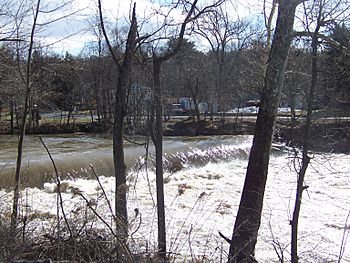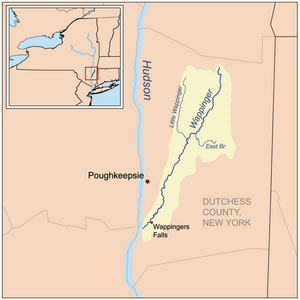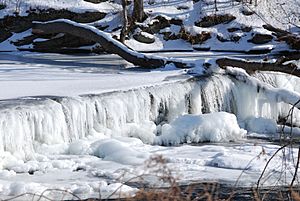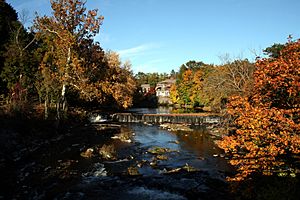Wappinger Creek facts for kids
Quick facts for kids Wappinger Creek |
|
|---|---|

Wappinger Creek at Red Oaks Mill at high flow
|
|

Wappinger Creek Watershed
|
|
| Native name | Ma-we-na-wasigh |
| Country | United States |
| State | New York |
| Region | Hudson Valley |
| County | Dutchess |
| Towns | Pine Plains, Stanford, Washington, Pleasant Valley, Poughkeepsie, LaGrange, Wappinger |
| Physical characteristics | |
| Main source | Thompson Pond Pine Plains 450 ft (140 m) 41°57′30″N 73°40′22″W / 41.95845°N 73.67284°W |
| River mouth | Hudson River New Hamburg 0 ft (0 m) 41°34′56″N 73°56′52″W / 41.5823158°N 73.9479157°W |
| Length | 41.7 mi (67.1 km), North–south |
| Basin features | |
| Basin size | 211 sq mi (550 km2) |
Wappinger Creek is a 41.7-mile-long (67.1 km) creek in Dutchess County, New York. It starts at Thompson Pond and flows into the Hudson River at New Hamburg. It is the longest creek in Dutchess County. It also has the largest area of land that drains into it, called a watershed. The creek is named after the Native American group known as the Wappingers.
About Wappinger Creek
Wappinger Creek flows from north to south. It runs along the eastern side of the Hudson River. The creek begins at Thompson Pond near Pine Plains. It then travels southwest until it reaches the Hudson River near New Hamburg.
The creek's width changes a lot along its path. The first .25 mi (0.40 km) of the creek flows through rocky, steep, and wooded areas. Closer to the Hudson River, the creek becomes wider. Here, you can find sandbars, mudflats, and marshy areas.
In the town of Wappingers Falls, the creek forms a human-made lake called Wappinger Lake.
Some people and maps call the creek "the Wappingers." This name is also used by the New York State Department of Environmental Conservation and the National Weather Service.
Animals in the Creek
Wappinger Creek is home to many different kinds of animals. It is a very important place for certain fish to lay their eggs. These fish are called anadromous fish. They live in the ocean but swim up rivers and creeks to lay eggs. You can find them in the creek between April and June.
Other fish live in the creek all the time. These include largemouth bass, bluegill, pumpkinseed, red-breasted sunfish, and brown bullhead. The creek is also stocked with different types of trout every year. This is done for people who enjoy fishing.
Tributaries
Wappinger Creek has four main streams that flow into it. These are called tributaries. The longest one is Little Wappinger Creek. It joins the main creek from the east side.
Here are the tributaries, listed from the northernmost (closest to the source) to the southernmost (closest to the mouth):
| Name | Mouth coordinates |
Source coordinates |
Remarks |
|---|---|---|---|
| Hunns Lake Creek | 41°52′29″N 73°42′10″W / 41.8748°N 73.7029°W | 41°54′50″N 73°38′39″W / 41.9139°N 73.6442°W | This creek is named after Hunns Lake, where it starts. |
| Willow Brook | 42°43′36″N 73°42′26″W / 42.7267°N 73.7072°W | 41°42′14″N 73°42′26″W / 41.7038°N 73.7072°W | It flows into Wappinger Creek where County Route 17 crosses. |
| East Branch Wappinger Creek | 41°48′50″N 73°45′29″W / 41.8139°N 73.7581°W | 41°47′39″N 73°41′33″W / 41.7942°N 73.6926°W | This is one of the two largest streams that feed into Wappinger Creek. |
| Little Wappinger Creek | 41°47′51″N 73°47′20″W / 41.7975°N 73.7890°W | 41°59′18″N 73°46′16″W / 41.9884°N 73.7712°W | This is the longest tributary of Wappinger Creek. |




